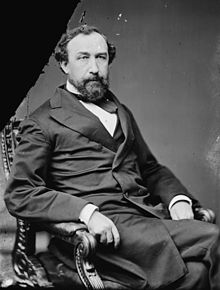Newton Booth
| Newton Booth | |
|---|---|
 |
|
| 11th Governor of California | |
|
In office December 8, 1871 – February 27, 1875 |
|
| Lieutenant | Romualdo Pacheco |
| Preceded by | Henry Huntly Haight |
| Succeeded by | Romualdo Pacheco |
|
United States Senator from California |
|
|
In office March 4, 1875 – March 4, 1881 |
|
| Preceded by | John S. Hager |
| Succeeded by | John F. Miller |
| Member of the California Senate | |
|
In office 1863 |
|
| Personal details | |
| Born |
December 30, 1825 Salem, Indiana |
| Died | July 14, 1892 (aged 66) Sacramento, California |
| Political party | Republican |
| Spouse(s) | Octavine C. Glover-Booth |
| Alma mater | Asbury University |
| Profession | Entrepreneur, politician |
Newton Booth (December 30, 1825 – July 14, 1892) was an American politician.
Born in Salem, Indiana, he attended the common schools. In 1841, his parents Beebe and Hannah Booth moved from Salem to Terre Haute, Indiana. Newton graduated from Asbury University, later renamed DePauw University, in nearby Greencastle, Indiana. He studied law in Terre Haute and was admitted to the bar in 1850. In the same year he moved to California, where he temporarily engaged in the wholesale grocery business at Sacramento. He made his fortune as a saloon keeper. He returned to Terre Haute in 1857 and engaged in the practice of law with future U.S. Congressman Harvey D. Scott until 1860, when he returned to Sacramento, and again engaged in mercantile pursuits. He was the uncle of author Booth Tarkington, son of his sister Elizabeth Booth, who was raised in Terre Haute. He married his business partner's widow Octavine C. Glover (1833-1907) on February 9, 1892.
Booth was elected to the California State Senate in 1862, serving in 1863, and was the eleventh governor of California from December 8, 1871 to February 27, 1875, when he resigned, having been elected to the United States Senate.
Elected as an Anti-Monopolist, he served as a Senator from March 4, 1875, to March 3, 1881; he was not a candidate for reelection in 1880. During his time in the Senate he served as chairman of the U.S. Senate Committee on Manufacturers and the U.S. Senate Committee on Patents, both during the 45th Congress. In 1876, the Greenback Party nominated him for Vice President of the United States on the ticket with Peter Cooper. However, Booth declined the nomination and Samuel F. Cary replaced him.
...
Wikipedia
